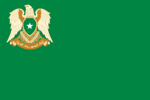Libya: Difference between revisions
Centrist16 (talk | contribs) |
m (1 revision imported) |
(No difference)
| |
Revision as of 19:22, 27 June 2023
Socialist People's Libyan Arab Jamahiriya الجماهيرية العربية الليبية الشعبية الاشتراكية (ar.) al-Jamāhīrīyah al-'Arabīyah al-Lībīyah ash-Sha'bīyah al-Ishtirākīyah | |
|---|---|
|
Anthem: Tamam Saidi | |
| Capital | Tripoli |
| Official languages | Arabic |
| Recognised regional languages | |
| Demonym(s) | Libyan |
| Government | Unitary socialist single-party republic |
| Her Excellency Hawwa al-Amman | |
| Jamal Qayyum | |
| Legislature | General People's Congress of Libya |
| National Assembly | |
| Establishment | |
| 5th of November 1912, Annexed by Italy | |
• Republic of Tripoli | 1919 |
• Annexation by the United Kingdom | 1924 |
• Independence | 1st of April 1959 |
| Area | |
• Total | 1,873,540 km2 (723,380 sq mi) |
| Population | |
• Census | 8.345.293 (2019) |
| Currency | Libyan Dinar (LYD) |
| Time zone | (UTC +2 |
| Driving side | right |
| Calling code | +58 |
| ISO 3166 code | AND |
| Internet TLD | .upca |
The Socialist People's Libyan Arab Jamahiriya (Arabic: الجماهيرية العربية الليبية الشعبية الاشتراكية, al-Jamāhīrīyah al-'Arabīyah al-Lībīyah ash-Sha'bīyah al-Ishtirākīyah), commonly referred to as Libya (Arabic ليبيا Lībiyā) is a country in the Maghreb region of North Africa. It borders the countries of Algeria and Tunisia to the west and northwest respectively; Egypt to the east; Chad to the south; and Niger to the southwest. To the north, Libya has a coastline of around 1,770 kilometres along the Mediterranean Sea. The Libyan population consists of around 8.3 million people, of whom 95% are Arab in descent. The majority of the country practices Sunni Islam, with around 90% of the population adhering to it. There are also significant religious minorities, most notably the Copts and Roman Catholics. The vast majority of Libyans live along the coastline, with around a quarter of them living in the capital Tripoli. Other significant cities are Benghazi and Misrata. Libya has historically been divided into three historical regions, Tripolitania in the north west, Fezzan in the south west and Cyrenaica in the east.
Etymology
History
Geography, climate, and environment
Demographics
Languages
Religion
Ethnic groups
Cities, towns, and municipalities
Government and politics
Administrative divisions
Foreign relations
Military
Law enforcement
Education
Health
Science and technology
Infrastructure
Culture
Literature
Cuisine
Music
Cinema
Television
Sports
See also
| This page uses material from the Wikipedia page Libya, which is released under the Creative Commons Attribution-ShareAlike 3.0 Unported License (view authors). |
- Stub-class articles
- Altverse II
- Articles containing Arabic-language text
- Libya
- North African countries
- Maghrebi countries
- Saharan countries
- Eastern Mediterranean
- Arabic-speaking countries and territories
- Berber-speaking countries and territories
- Communist states
- Member states of the African Union
- Member states of the Arab League
- Member states of OMEAD
- Member states of the League of Nations
- Countries in Africa
- One-party states
- Republics
- States and territories established in 1959
- 1959 establishments in Africa


